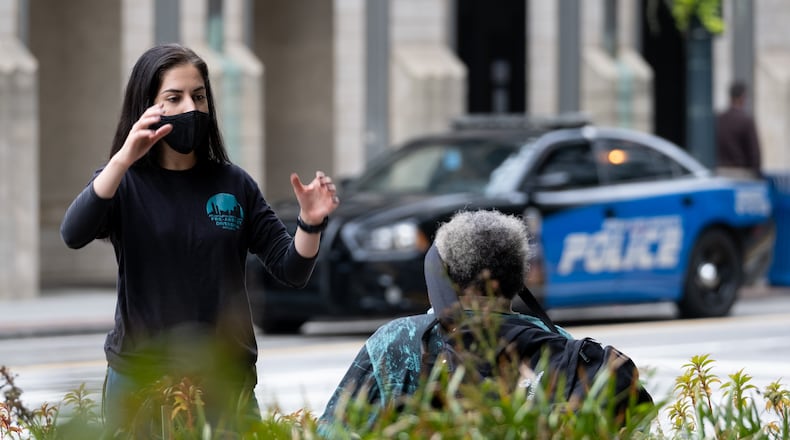Atlanta’s founding prearrest diversion program is suspending its services in the city of Atlanta after a monthslong contract battle with Mayor Andre Dickens’ administration.
The Policing Alternatives and Diversion Initiative helps residents experiencing extreme poverty, substance abuse or mental health problems to avoid jail time and connect with community-based resources. The city funnels clients of the initiative through the police department and ATL311 hotline.
But the fate of the program has been unclear since spring, when legislation approving a new multiyear agreement with the city stalled after pressure from the mayor’s office.
While Atlanta City Council members questioned why they were being asked to hold off on voting on the contract, officials in the mayor’s office weighed other options behind closed doors. The city issued a request for proposal for the same services already awarded to the Policing Alternatives and Diversion Initiative but excluded the organization from bidding through a closed, special procurement process.
Supporters of the diversion program celebrated when council members bucked the mayor’s wishes and approved PAD’s contract during a meeting in November. Council member Amir Farokhi even accused the mayor’s executive staff of being “confusing” and “gaslighting” in their arguments against the agreement.
But despite the council’s vote to move the contract forward, PAD’s leadership said it will end its services in Atlanta after the contract failed to be finalized before the first of the year.
“We have done everything in our power to ensure the continuity of the compassionate in-person aid that residents have come to rely on,” PAD Executive Director Moki Macías said in a statement. “Once the contract is executed, we look forward to continuing to serve our community as Atlanta’s homegrown, community-based non-police response team.”
In an email sent earlier this month, Macías said the program will discontinue when the current contract expires Dec. 31.
“We remain committed to providing the high-quality mobile response services that we are known for and hope to do so beginning January 1, 2025,” she wrote to the city’s chief operating officer, police chief and City Council members.
The mayor’s office said Thursday that PAD and the city disagreed over performance metrics included in negotiations and offered to extend work with the diversion program on a month-to-month basis.
“After negotiating in good faith, and arriving at a new agreement with PAD, their Executive Director has announced that they are suspending their work with the City of Atlanta, nevertheless,” a spokesperson for the mayor’s office said. “The City offered to extend its ongoing month to month contract until this process was complete to ensure PADs work would continue.
“PAD refused.”
The mayor’s office said residents seeking assistance with substance abuse or mental health emergencies can still call ATL311 and will be assisted by the city’s HOPE team run by the police department.
According to the diversion organization’s monthly reports, the program helped divert more than 250 Atlantans from jail to community resources from January through October 2024. The organization has worked with ATL311 since 2021 and responded to over 1,800 calls last year, according to the reports.
Top aides for Dickens have publicly questioned the success of the program compared to the level of funding dedicated to it.
“What we have seen is a huge increase in funding, but the numbers are beginning to trickle down,” Atlanta’s Chief Operating Officer, LaChandra Burks, said Nov 18. “And that is a cause of concern for us.”
Dozens of Atlantans who avoided jail time because of the program disagree.
Tanesha Door was first introduced to PAD in 2020 when she was experiencing homelessness during the pandemic and then again not long after to help her escape domestic violence.
“Today, I stand before you not just as a survivor, but as a mother who can now provide a safe, loving home for her children,” she said during a Nov. 4 City Council meeting. “PAD’s support was more than just meeting basic needs; it restored my dignity and empowered me to thrive.”
About the Author
Keep Reading
The Latest
Featured


